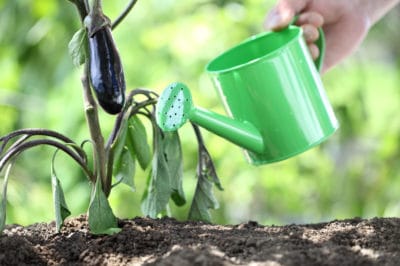Thing to Consider When Watering Eggplant
Eggplants need consistent watering of at least 1 inch every week, especially seedlings. Rather than giving your eggplants several short waterings per week, it’s better to provide one thorough soaking that reaches 6 inches into the soil. This encourages the eggplant roots to grow deep into the soil.
Try not to over-water your eggplants because it can cause fungus and disease. On the other hand, short, frequent watering makes your eggplants develop shallow roots that dry out quickly, and yellow leaves develop.
Best Time to Water Eggplant
Early morning and nighttime watering is the best for your eggplants. Watering during these times reduces evaporation, and allows your eggplant leaves to dry quickly before the sun comes out. Avoid watering in the middle of the day when the sun evaporates the water. Also, skip watering on windy days because you can lose half the water that should be going to your eggplants.
Watering and Soil
The amount of water you need to give your eggplants depends on your soil type and weather conditions. Sandy soil needs more water than loam, so adjust your watering cycle accordingly. As far as weather goes, if you live in a hot, dry area, your plants will need more water than a cool, temperate climate. If your soil and climate are difficult for growing eggplant, try planting in containers that you can keep watered, and protected from dry weather.
Methods to Retain Water in the Soil
Eggplants are made up of water, so keeping them hydrated is essential for a successful harvest. If you live in a dry area without much rainfall, or your area has water bans in effect, then there are a few thing you can do to conserve water. After giving your eggplants a soaking, use one or all of these methods for keeping them moist for a longer time:
- Spread plastic mulch around the base of your plants.
- Apply organic mulch, like hay, leaves or grass clippings, 3 to 4 inches thick over your soil.
- Make water jug irrigation by punching small holes in the bottom of a plastic, gallon jug, and burying it in the soil next to your eggplants. Leave the neck out of the soil. Fill the jug with water, letting the water gradually seep into the ground.
- Use a drip hose that slowly supplies water to the soil.
Weeding and Cultivating Eggplant
Weeding is crucial for conserving water. Weeds waste water, and compete with your eggplants for sunlight and nutrients. When weeding your garden, only cultivate the surface of the soil. Deep cultivation can damage your eggplant roots, and cause water evaporation. If you applied plastic mulch to your garden, you won’t have to worry about too much weed growth.
